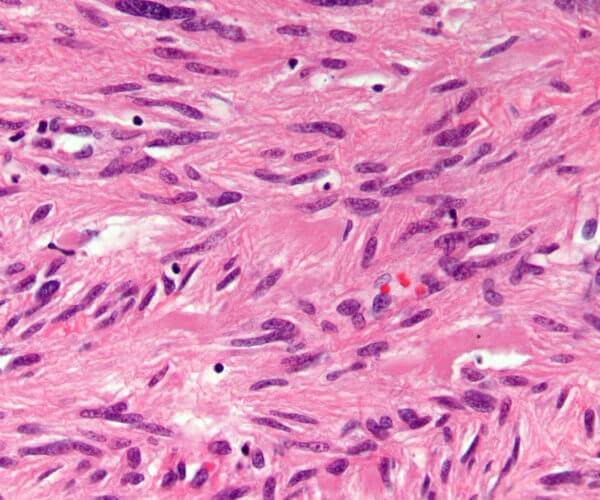
New Targeted Therapies Show Promise for Treating Advanced GIST
December 21, 2016 by NCI Staff
Two early-phase clinical trials testing new targeted therapies for advanced gastrointestinal stromal tumors (GIST) have produced promising preliminary results.
Both therapies are designed to shut down an aberrant molecular signaling pathway that drives most cases of GIST. The phase I trials are still ongoing, but the early results hint at their potential effectiveness in patients who have already tried several other treatments, shrinking or stabilizing tumors in some trial participants.
Although the findings are preliminary, Lee Helman, M.D., of NCI's Center for Cancer Research, said the drugs show substantial promise as a treatment for patients with GIST whose tumors stop responding to standard therapies.
The trial results were presented earlier this month at the EORTC-NCI-AACR Molecular Targets and Cancer Therapeutics Conference in Munich.
GIST is a type of sarcoma that arises from tissues of the gastrointestinal tract. GIST can sometimes be removed with surgery, but some tumors are too large to be removed surgically or are located near organs that could be damaged in the process.
For many years, GIST that could not be surgically removed "was considered medically untreatable, as conventional sarcoma chemotherapy has no impact," said trial investigator Michael Heinrich, M.D., of the Oregon Health & Science University Knight Cancer Institute, during his presentation of the trial data.
But a "revolution in the treatment of GIST" began around the turn of the century, Dr. Heinrich explained, when studies showed that most GISTs are driven by gene mutations that can be targeted with a type of drug called a tyrosine kinase inhibitor (TKI). TKIs approved to treat GIST currently include imatinib (Gleevec®), sunitinib (Sutent®), and regorafenib (Stivarga®).
Although these drugs represent an important advance in GIST treatment, resistance to TKIs eventually develops. But researchers now better understand how this resistance arises in patients with GIST. It appears that specific mutations in the KIT and PDGFRα genes allow tumor cells to bypass the "off switch" created by TKIs like imatinib, Dr. Heinrich said, reactivating the molecular signaling pathway that drives GIST, even in the presence of those drugs.
The two drugs highlighted at the conference, BLU-285 and DCC-2618, were designed to work around these molecular mechanisms of resistance by blocking the mutations in KITand PDGFRα that tell tumor cells to continue to proliferate.
The trial testing BLU-285, developed by Blueprint Medicines, is enrolling patients who previously received at least two other TKIs or had a gene mutation linked to TKI resistance at diagnosis. Seven of the 32 patients evaluated to date, many of whom had received more than 3 prior treatment regimens, experienced partial tumor responses, and tumors stopped growing in 10 others.
Patients in the trial of DCC-2618, developed by Deciphera Pharmaceuticals, had already received more than four previous TKIs on average. Most had GIST, but three had rare tumor types that share the same drug-resistance mutations with GIST.
PET imaging scans showed that the drug rapidly slowed tumor metabolism, and two patients have had long-term partial responses to treatment: one with GIST, and one with glioblastoma multiforme, an aggressive brain cancer that is extremely resistant to treatment.
In both studies, tumor DNA circulating in the bloodstream disappeared rapidly at the start of treatment, even before any tumor responses were seen on imaging scans.
Patients in both trials had relatively few side effects from the drugs. In the BLU-285 trial, no patients to date have had to stop treatment due to drug-related side effects. In the DCC-2618 trial, only one has had to stop treatment. Neither trial has yet identified the maximum tolerated dose for its drug.
Based on the results seen so far, Dr. Helman said, both drugs could also eventually have potential as an earlier treatment for patients with GIST, before resistance can set in.
"This is what we see when we're lucky enough to have a really good target, to understand mechanisms of resistance, and then have drugs that actually target the resistance mutations. You can get pretty spectacular results," said Dr. Helman. "When you have a drug that hits the target, it works."


































No hay comentarios:
Publicar un comentario